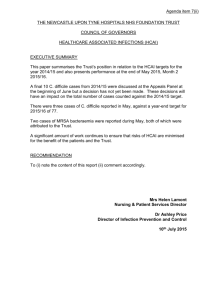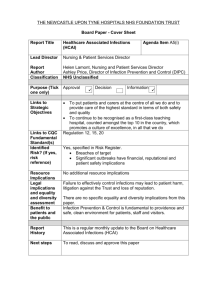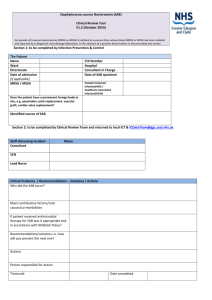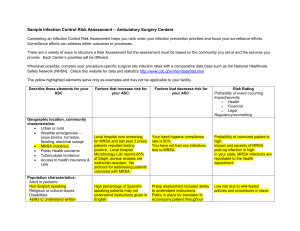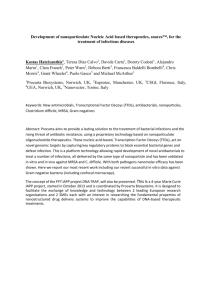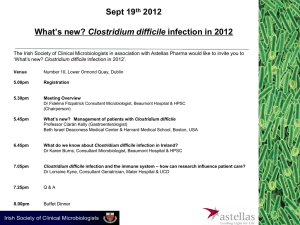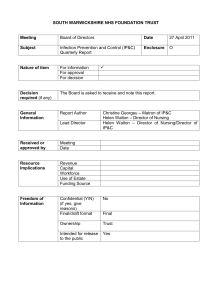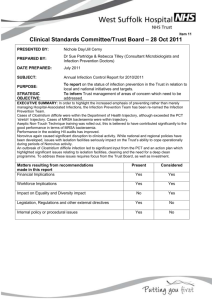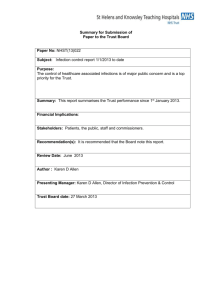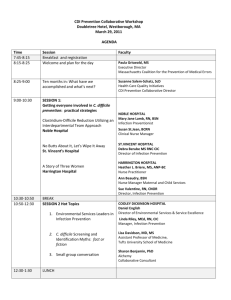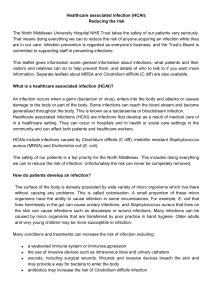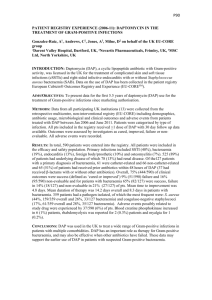Oct_2015_A5i_Healthcare_Associated_Infections_October_2015
advertisement
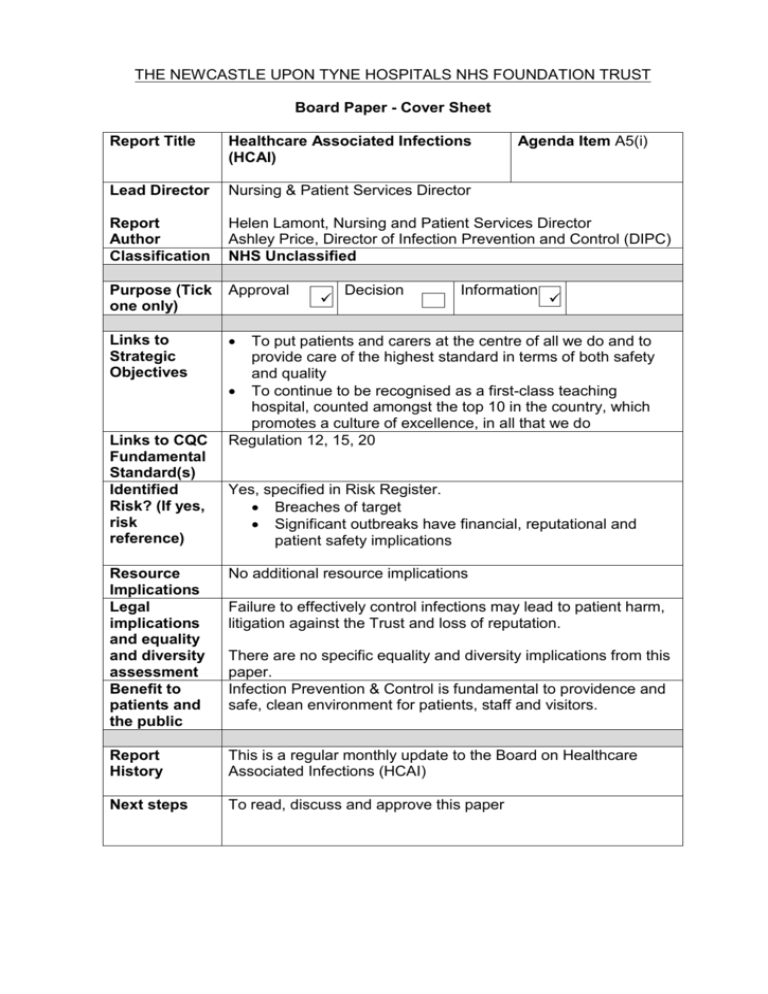
THE NEWCASTLE UPON TYNE HOSPITALS NHS FOUNDATION TRUST Board Paper - Cover Sheet Report Title Healthcare Associated Infections (HCAI) Lead Director Nursing & Patient Services Director Report Author Classification Helen Lamont, Nursing and Patient Services Director Ashley Price, Director of Infection Prevention and Control (DIPC) NHS Unclassified Purpose (Tick one only) Approval Links to Strategic Objectives Links to CQC Fundamental Standard(s) Identified Risk? (If yes, risk reference) Decision Agenda Item A5(i) Information To put patients and carers at the centre of all we do and to provide care of the highest standard in terms of both safety and quality To continue to be recognised as a first-class teaching hospital, counted amongst the top 10 in the country, which promotes a culture of excellence, in all that we do Regulation 12, 15, 20 Yes, specified in Risk Register. Breaches of target Significant outbreaks have financial, reputational and patient safety implications Resource Implications Legal implications and equality and diversity assessment Benefit to patients and the public No additional resource implications Report History This is a regular monthly update to the Board on Healthcare Associated Infections (HCAI) Next steps To read, discuss and approve this paper Failure to effectively control infections may lead to patient harm, litigation against the Trust and loss of reputation. There are no specific equality and diversity implications from this paper. Infection Prevention & Control is fundamental to providence and safe, clean environment for patients, staff and visitors. Agenda item A5(i) THE NEWCASTLE UPON TYNE HOSPITALS NHS FOUNDATION TRUST HEALTHCARE ASSOCIATED INFECTIONS (HCAI) EXECUTIVE SUMMARY This paper summarises the Trust’s position in relation to HCAI and the external targets at the end of September 2015, Month 6 2015/16. There were seven C. difficile cases in September, bringing the total to date to 40 against a year-end target for 2015/16 of 77. Seven cases have been successfully appealed and four more are being considered. Two further cases of MRSA bacteraemia were reported during September, which were attributed to the Trust. This means that five MRSA cases are currently attributed to the Trust so far in 2015/16. A significant amount of work continues to ensure that risks of HCAI are minimised for the benefit of the patients and the Trust including Ward refurbishments on both sites. RECOMMENDATION To (i) note the content of this report (ii) comment accordingly. Mrs Helen Lamont Nursing & Patient Services Director Dr Ashley Price Director of Infection Prevention and Control 19th October 2015 THE NEWCASTLE UPON TYNE HOSPITALS NHS FOUNDATION TRUST HEALTHCARE ASSOCIATED INFECTIONS (HCAI) 1. INTRODUCTION This paper provides the monthly report to the Board in relation to Healthcare Associated Infections (HCAI) describing the progress against targets for the year, and reporting the Trust’s position for the end of Month 6 (2015/16). The performance is summarised in the Healthcare Associated Infection report at Appendix i. 2. INFECTION UPDATE (i) MRSA Bacteraemia – (Target = Zero Tolerance) Two further cases of MRSA were reported during September 2015, both of which were attributed to the Trust. This means that five cases are attributed to the Trust so far in 2015/16. The CCG-attributed case of MRSA from August has now been assigned as ‘Third Party’ following review by NHS England (North). The Third Party category is used in cases where the MRSA bacteraemia cannot legitimately be assigned to either the CCG or the Trust. In relation to the first of September’s Trust-acquired bacteraemia, a Post-Infection Review meeting has taken place and this has been followed up with a Serious Infection Review Meeting, which identified some learning needs in relation to antibiotics, and that the patient was not always compliant with advice. The second case of MRSA bacteraemia in September was identified in a different area. As the case was identified at the end of the month, investigations are still ongoing. The patient regularly attends as both an inpatient and day case at Freeman Hospital along with other hospitals in the region. Initial investigations have highlighted the patient has a history of MRSA colonisation. (ii) Clostridium difficile – (Target = 77) The Board is aware that with the Trust’s target has been set at 77 cases for the year ahead. In September, 7 cases were identified, bringing the year-to-date total to 40 cases, against a cumulative target of no more than 38.5 cases. Taking into account the 7 appeals, this means 33 cases for the year to date. The graph below demonstrates this year’s performance when compared with the number of cases last year, i.e. in 2014/15 before taking into account the successful appeals (89 as a year-end figure in 2014/15, rather than 65). At the same time last year, the Trust was in the same position as it had reported 40 cases of C. difficile by September 2014. 1 C. diff 2014/15 & 2015/16 100 90 80 70 60 50 40 30 20 10 0 (iii) Apr May Jun Jul Aug Sep Oct Nov Dec Jan Feb C. difficile 2014/15 6 13 20 27 33 40 50 55 62 70 80 Mar 89 Trajectory 2015/16 6.4 12.8 19.3 25.7 32.1 38.5 44.9 51.4 57.8 64.2 70.6 77.0 C. difficile 2015/16 5 8 14 23 33 40 C. difficile Appeals Of the 40 cases reported so far in 2015/16, 7 cases have been successfully appealed, with a further 4 being considered for appeal. This brings the total counted against the target to 33 cases. MSSA In September there were again 9 MSSA bacteraemia attributed to the Trust, bringing the year-to-date total to 39 cases. This is compared with 32 cases at the same point in 2014/15. There are currently no national targets for MSSA but the Trust continues to monitor and report the numbers of MSSA bacteraemia. Root Cause Analysis (RCA) is undertaken in cases where a Consultant Microbiologist feels there are lessons to learn. (iv) E. coli In September there were 14 E. coli bacteraemia attributed to the Trust, bringing the year-to-date total to 75 cases. This is compared with 75 cases at the same points in 2014/15. The numbers will continue to be monitored monthly by IPCC. As with MSSA, there are currently no national targets for E. coli but the Trust continues to monitor and report their numbers. The primary source of each E. coli bacteraemia is recorded by the Microbiology lab for information. 3. ONGOING WORK (i) Communication Mandatory Training In September, compliance with IPC Mandatory Training was 80%. There are now seven bespoke programmes to cater for the needs of different staff groups and each 2 staff member is allocated their appropriate programme; the above compliance rate reflects the combined scored for all seven. IPC Mandatory Training continues to be a priority for the Trust and compliance levels are monitored on an ongoing basis. (ii) Outbreaks During September there was one outbreak of diarrhoea and vomiting at the RVI. The ward was temporarily closed to admissions resulting in 43 bed days lost, norovirus was identified as the causative organism. (iii) Flu Vaccination Campaign The ‘flu campaign’ was launched on Monday 28th September. The delivery of the campaign is in partnership with Lloyds Pharmacy. Over the first week approximately 900 vaccines have been administered by Lloyds and Trust Peer vaccinators via sessions on pre-determined Wards or at defined dropin clinics. The service has been well received. Daily debrief meetings between key members of the Trust’s flu team and the Lloyds contractors means that the Trust is continuing to deliver an improved and efficient service. Vaccination uptake rates will be reported to Board starting in November. (iv) C. difficile Campaign Throughout September the IPCNs have visited wards with interactive activities to raise awareness and promote the new eRecord C. difficile documentation, as part of the planned C. difficile Campaign. The roadshows have been Ward-based to encourage clinical staff attendance. To enhance staff participation, the campaign has been extended for an additional month and will continue throughout October. Within Care of the Elderly there is some focused work with link staff to promote best practice in relation to diarrhoea management to support staff in identifying risk factors to prevent occurrence of C. difficile. (v) MERS-CoV MERS-CoV (Middle East Respiratory Syndrome Coronavirus) is an emerging international threat with recent outbreaks occurring in Middle East countries and South Korea. National guidance is currently available on the assessment and management of MERS-CoV and the Trust management flow chart can be found on the intranet. More detailed Trust guidance for the management of this and other highly pathogenic respiratory organisms is in development. 3 4. RISKS AND RISK MITIGATION Risks relating to Infection Prevention and Control are monitored and managed on an ongoing basis at the monthly IPCC and the IPC Operational Group, which meets twice a month. As well as the high-profile work to minimise MRSA and C. difficile infections, the IPC Team works hard to ensure that the Trust protects its patients from the threats posed by emerging infections. All key infection risks are recorded on the Trust’s Risk Register, with the person responsible being clearly identified, and the Register being regularly reported at IPCC. 5. SUMMARY The current MRSA bacteraemia and C. difficile position continues to be a high priority in relation to patient safety and the potential financial and reputational risks to the Trust. A significant amount of high profile Trust-wide work continues across all aspects of IPC to protect the patients in the care of the Trust. 6. RECOMMENDATION To (i) note the content of this report (ii) comment accordingly. Mrs Helen Lamont Nursing & Patient Services Director Dr Ashley Price Director of Infection Prevention and Control 19th October 2015 4
